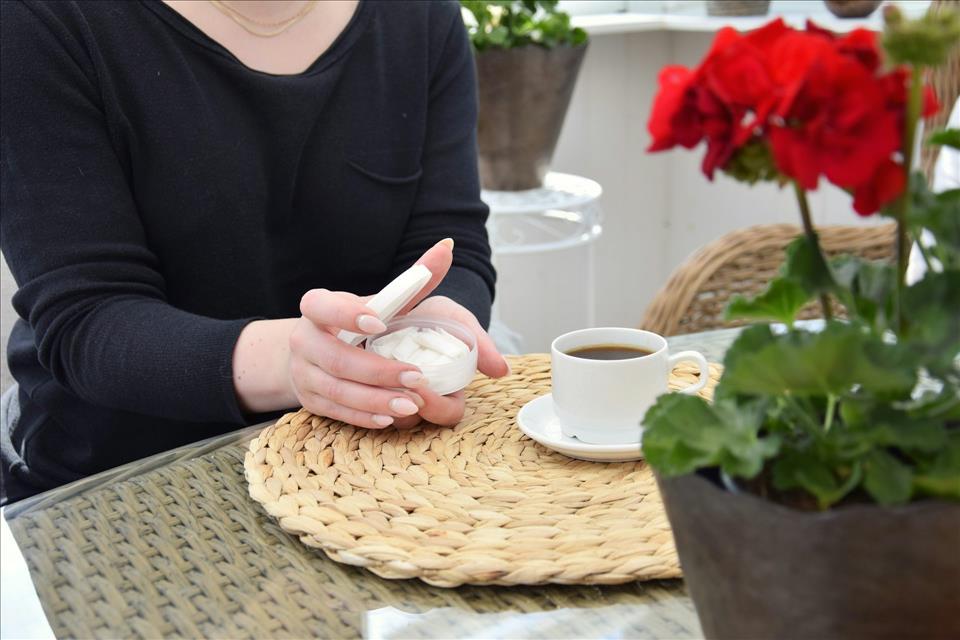
Caffeine Pouches Deliver A Fast Hit And Hidden Risks
Caffeine pouches look and work a lot like nicotine pouches or snus . Each small, pillow-shaped packet contains micro-ground caffeine, flavourings and sometimes herbs or vitamins. Slip one under your lip and the caffeine goes straight into the bloodstream through your gums – bypassing the digestive system. The result? A jolt of energy that lands far quicker than a cup of coffee or tea.
Caffeine perks us up by blocking adenosine , a brain chemical that makes us feel sleepy. People have long used coffee, tea and energy drinks to stay awake, sharpen focus and boost performance . Pouches simply offer a hands-free, no-spill shortcut. Some gym-goers and shift workers like the convenience, while athletes value caffeine's ability to increase endurance by making the brain register less fatigue and pain.
Their discreet design is also a selling point for teenagers, who may use them to stay alert in class or during exams. That worries experts: some fear caffeine pouches could be a gateway to nicotine or other stimulants, and some young users are even pairing them with nicotine pouches, doubling the stimulant load. TikTok has super-charged their popularity, with influencers showing them off in classrooms, gyms and gaming sessions.
Read more: Why nicotine pouches may not be the best choice to help you to stop smoking
Potent little packetsDepending on the brand, each pouch delivers 25mg to more than 200mg of caffeine. For comparison, a typical mug of instant coffee contains about 100mg, a mug of tea 75mg and a can of cola around 40mg. Some pouches therefore pack the caffeine punch of two cups of coffee in one hit.
How much is too much? For healthy adults, the recommended daily limit is around 400mg. Pregnant women are advised to stay below 200mg per day because higher intakes can increase the risk of complications such as low birth weight or pregnancy loss .
There's little data on safe levels for children, but the European Food Safety Authority recommends a lower limit of 3mg of caffeine per kilogram of body weight – roughly 45–150mg per day depending on age and size. Children's smaller bodies and developing systems make them more sensitive to caffeine's effects.
A single pouch with 200mg of caffeine can easily push a teenager well beyond that limit. And because the drug is absorbed so quickly, side-effects, such as jitteriness, anxiety, insomnia and heart palpitations , can hit harder. Caffeine may give a short-term buzz, but it can also disturb sleep, create a cycle of fatigue and lead to dependence .
Who's most at riskModerate caffeine is generally safe for most adults, but certain groups are more vulnerable. People with mental health conditions may be especially sensitive.
By blocking adenosine and boosting dopamine activity, caffeine can worsen anxiety or psychosis and even increase the risk of relapse in conditions such as schizophrenia or bipolar disorder . It can also make other addictive substances feel more rewarding, potentially nudging people toward substance use disorders. The science isn't yet clear enough to set a safe limit for these groups.
Those with heart problems also need to be cautious. Caffeine temporarily raises heart rate and blood pressure, adding stress to the heart. Some people experience palpitations, and athletes who mix high doses of caffeine with intense exercise may face an elevated risk of heart issues.
Extreme cases are rare, but there have been documented caffeine-related deaths , usually involving supplements or highly concentrated products: reminders of how potent this commonplace stimulant can be.
A regulatory blind spotIn the UK, caffeine pouches occupy a legal grey zone. They're neither food nor medicine, so they escape the usual safety checks and labelling rules. Shoppers can't always be sure how much caffeine they're getting – or what other ingredients might be mixed in. Health experts are calling for clearer warnings and age restrictions, particularly as many brands use fruity flavours and bright packaging designed to catch the eye of younger consumers.
Caffeine pouches may be fashionable and convenient, but their rapid absorption and high potency make it easy to overshoot safe limits, especially for teens. An occasional pouch might not be harmful for most adults, but they're no risk-free substitute for coffee or tea. As with any stimulant, moderation isn't just sensible, it's essential.

Legal Disclaimer:
MENAFN provides the
information “as is” without warranty of any kind. We do not accept
any responsibility or liability for the accuracy, content, images,
videos, licenses, completeness, legality, or reliability of the information
contained in this article. If you have any complaints or copyright
issues related to this article, kindly contact the provider above.


















Comments
No comment